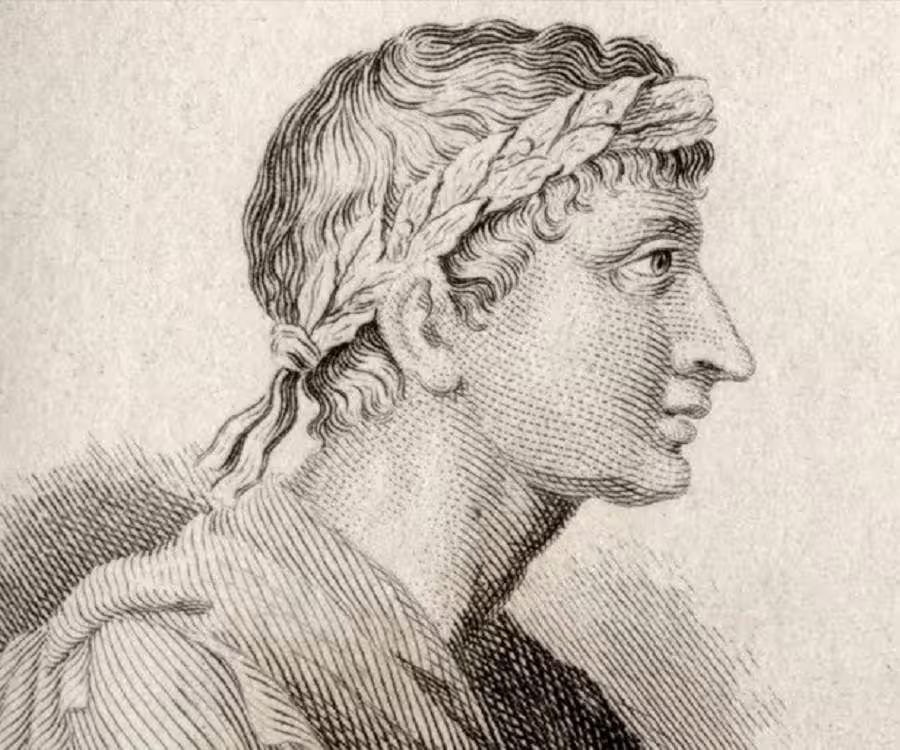ovid <3<3<3
Ovid
From Wikipedia, the free encyclopedia
For other uses, see Ovid (disambiguation).
Publius Ovidius Naso (Latin: [ˈpuːbliʊs ɔˈwɪdiʊs ˈnaːso(ː)]; 20 March 43 BC – AD 17/18), known in English as Ovid (/ˈɒvɪd/ OV-id), was a Roman poet who lived during the reign of Augustus. He was a younger contemporary of Virgil and Horace, with whom he is often ranked as one of the three canonical poets of Latin literature. The Imperial scholar Quintilian considered him the last of the Latin love elegists. Although Ovid enjoyed enormous popularity during his lifetime, the emperor Augustus exiled him to Tomis, the capital of the newly-organised province of Moesia, on the Black Sea, where he remained for the last nine or ten years of his life. Ovid himself attributed his banishment to a "poem and a mistake", but his reluctance to disclose specifics has resulted in much speculation among scholars.
Ovid is most famous for the Metamorphoses, a continuous mythological narrative in fifteen books written in dactylic hexameters. He is also known for works in elegiac couplets such as Ars Amatoria ("The Art of Love") and Fasti. His poetry was much imitated during Late Antiquity and the Middle Ages, and greatly influenced Western art and literature. The Metamorphoses remains one of the most important sources of classical mythology today.
Iamque opus exegi, quod nec Iovis ira nec ignis
nec poterit ferrum nec edax abolere vetustas.
cum volet, illa dies, quae nil nisi corporis huius
ius habet, incerti spatium mihi finiat aevi:
parte tamen meliore mei super alta perennis
astra ferar, nomenque erit indelebile nostrum,
quaque patet domitis Romana potentia terris,
ore legar populi, perque omnia saecula fama,
siquid habent veri vatum praesagia, vivam.I’ve made a masterpiece Jove’s wrath cannot
destroy, nor flame, nor steel, nor gnawing time.
That day, which governs nothing but my body,
can end at will my life’s uncertain span.
And yet my finer half will be eternal,
borne among stars. My name can’t be erased.
Where Roman power spreads through conquered lands,
I will be read on people’s lips. My fame
will last across the centuries. If poets’
prophecies can hold any truth, I’ll live.—Ovid, Metamorphoses 15.871–879 (trans. Stephanie McCarter)

On Ovid
I see him there on a night like this but cool, the moon blowing through black streets. He sups and walks back to his room. The radio is on the floor. Its luminous green dial blares softly. He sits down at the table; people in exile write so many letters. Now Ovid is weeping. Each night about this time he puts on sadness like a garment and goes on writing. In his spare time he is teaching himself the local language (Getic) in order to compose in it an epic poem no one will ever read.
—Anne Carson
It’s also true that Ovid can be repetitive, but the repetitions are often deliberate and, in fact, part of the poetry – both its music and its wider structure.
—Claire Pollard, Ovid's Heroines
Essays about Ovid
- "Future Reflexive: Two Modes of Allusion and Ovid's Heroides", Alessandro Barchiesi
- "Medea in Ovid: Scenes from the Life of an Intertextual Heroine", Stephen Hinds
- "Ovid and the Law", E. J. Kenney
- "How (Not) to Translate the Female Body", Stephanie McCarter
- "Ovid and the Politics of Reading", Allison Sharrock
To propose that Ovid is writing primarily for lawyers would be unforgivably glib, no doubt, but it may not be entirely lacking in explanatory power.
—Llewelyn Morgan, Ovid: A Very Short Introduction
In the world of translation, Ovid’s great poem, for me, is the sun. No other text I know illuminates what translation does, means, or is with equal power, and without it as an ongoing point of reference, my understanding of life, language, and literature would go dark.
—Jhumpa Lahiri, Translating Myself and Others, 7
To read Ovid with an eye toward his full complexity—his beauty and his brutality—allows us to scrutinize our own thorny relationship with the past and with the ambivalent inheritance we have received from it. To wrestle with the unsavory aspects of ancient literature is to do the hard work of self-examination. It is easier to talk about love than rape or to focus on ennobling values rather than try to grasp our own human failings. Yet it is precisely this hard work that Ovid invites us to do.
—Stephanie McCarter, "Does Ovid Still Matter Today?"
non est, quam piget esse piam!
She who regrets having been righteous, isn't!
—Her. 14.14
[STEPHANIE MCCARTER:] One thing that is particularly true of Ovid is that he changes as we change.
The ‘poet at play’ is not necessarily the poet trivialized.
—D. W. T. Vessey, "Humor and Humanity in Ovid's Heroides", 94
Poems about Ovid
- "On Ovid", Anne Carson
- "Ovid's Farewell", J. D. McClatchy
- "Night Singing", W. S. Merwin
- "To the Sea", Marin Sorescu (trans. Michael Hamburger)
Ovid is not only one of the finest writers of antiquity; he is also one of the finest readers. Not since Callimachus, perhaps, had a poet shown such understanding in depth and in detail of the literary traditions of which he was the inheritor; never was such understanding carried so lightly. In a national literature dominated by anxious gestures towards the past, Ovid's relationship with his predecessors is exuberantly unanxious. Moreover, the same revisionary energy which he brings to alien texts is applied no less to his own.
—Stephen Hinds, Oxford Classical Dictionary s.v. "Ovid"